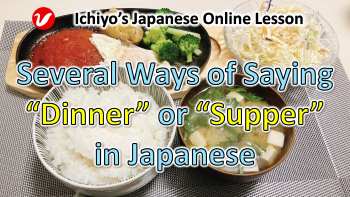There are other Japanese words for “dinner” or “supper,” not only「夕食 (ゆうしょく、yūshoku)」and「夕飯(ゆうはん、yūhan」). Please learn them and the nuances of their meaning through this page.
Several Ways of Saying “Dinner” or “Supper”
| Key Word | 夕食 | 夕飯 | 夕御飯、夕ご飯 |
| Hiragana | ゆうしょく | ゆうはん | ゆうごはん |
| Romaji Reading | yūshoku | yūhan | yūgohan |
| English Meaning | dinner, supper | dinner, supper | dinner, supper (Polite Form) |
「夕食」and「夕飯」are the same.
| 晩御飯、晩ご飯 | 夕飯 | 晩飯 |
| ばんごはん | ゆうめし | ばんめし |
| bangohan | yūmeshi | banmeshi |
| dinner, supper (Polite Form) | dinner, supper (Male Language, Not Polite) | dinner, supper (Male Language, Not Polite) |
「晩御飯」and「夕御飯」are polite forms. However, we feel they have no difference compared with「夕食」and「夕飯」. We sometimes write the kanji「御」in hiragana.「夕飯」and「晩飯」are the male languages and are not polite.
Other Vocabulary
ディナー(dinā)
Meaning: Dinner
「ディナー」is usually used in restaurants. Therefore, it often indicates a restaurant dinner.
夜食(やしょく、yashoku)
Meaning 1: Dinner or supper.
Meaning 2: Late-night dinner or supper.
「夜食」often means meaning 2.
晩餐(ばんさん、bansan)
Meaning: special dinner
When we read or hear「晩餐」, it creates an image of a dinner for high-ranking people like a noble or an emperor.
Wrong Vocabulary Japanese People Use For “Dinner/Supper”
Wrong:
夜ご飯(よるごはん、yorugohan)
Correct:
晩御飯/晩ご飯 (ばんごはん、bangohan)
Have you heard Japanese people use the word「夜ご飯」? It does not appear in the Japanese dictionary but the terms「晩御飯」and「晩ご飯」are correct. However, some people use it nowadays.
「夜」means “night” and「ご飯」means “meal” or “rice.”
| Correct | Correct | Wrong | |
| Key Word | 朝ご飯 | 昼ご飯 | 夜ご飯 |
| Hiragana | あさごはん | ひるごはん | よるごはん |
| Romaji Reading | asagohan | hirugohan | yorugohan |
| English Meaning | breakfast | lunch | dinner, supper |
「朝」= morning, 「昼」= noon
The Correct Japanese Pronunciations
Please learn the pronunciation by watching the attached video. You can also learn example sentences.
Video: Coming Soon
Our main YouTube channel: Ichiyo’s Japanese YouTube Channel
Our sub-YouTube channel (Japanese vocabulary videos): Ichiyo’s Subchannel
Example Sentences
It is important to have skills in both non-honorific and honorific languages in order to use Japanese correctly.
I cooked omelet rice for dinner.
Plain Form:
夕食にオムライスを作った。
Yūshoku ni omuraisu o tsukutta.
Polite Form:
夕食にオムライスを作りました。
Yūshoku ni omuraisu o tsukurimashita.
My husband prepares dinner.
Plain Form:
夕飯は夫が準備する。
Yūhan wa otto ga junbi suru.
Polite Form:
夕飯は夫が準備します。
Yūhan wa otto ga junbi shimasu.
I’ll start preparing dinner now.
Plain Form:
今から夕ご飯の支度を始める。
Ima kara yūgohan no shitaku o hajimeru.
Polite Form:
今から夕ご飯の支度を始めます。
Ima kara yūgohan no shitaku o hajimemasu.
What would you like for dinner tomorrow?
「晩ご飯」is more polite than「夕食」and「夕飯」. However, we can use it in non-honorific sentences.
Spoken and Non-Honorific Language:
明日の晩ご飯は何がいい?
Ashita no bangohan wa nani ga ī.
Spoken Language and Polite Form:
明日の晩ご飯は何がいいですか。
Ashita no bangohan wa nani ga ī desu ka.
「いい」is a spoken language.
